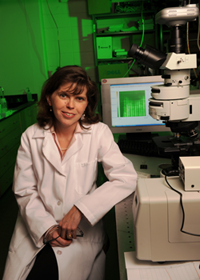President Obama Honors STS Alumna Virginia Davis
By Caitlin Jennings, Communications Coordinator, Society for Science & the Public

Virginia Davis (Science Talent Search 1986) will receive the Presidential Early Career Award for Scientists and Engineers (PECASE). When Virginia found out she thought, “It was very exciting and a tremendous honor as well as a lot to live up to.”
It is the highest honor that the U.S. President gives to scientists in the early stages of their research careers. According to the National Science Foundation, awardees are selected based on two criteria: “pursuit of innovative research at the frontiers of science and technology and a commitment to community service as demonstrated through scientific leadership, public education, or community outreach.”
Nanotechnology, Virginia’s research area, involves “taking nanomaterials, which we treat like little bitty building blocks, and figuring out how to put them together to make new materials for different applications.” She is currently working with materials that people didn’t even know existed 20 years ago. Her focus is on assembling these materials to transform their interesting chemical and physical properties into useful applications.
Virginia says she has a lot of people to thank for her success, including her high school chemistry teacher, John Liebermann, who encouraged old laboratories to donate equipment to their school. She used that equipment for her STS research, which earned her a spot as one of the 40 finalists. As a finalist she met Glenn Seaborg, former chair of the Society’s Board of Trustees. “I was just so awed that a Nobel Prize winner would take the time to talk to a high school student,” she says. Virginia hasn’t forgotten how important that support was.
“When I was going through middle school and high school, my mother kept saying ‘ok, when you make it, you have to remember this, you have to…pay it forward,’” Virginia says, which is why she helps aspiring scientists by judging at local science fairs and helping to create and run NanoCamp through Auburn University’s Youth Experience in Science (YES) program. At NanoCamp, a day and residential camp for middle school students, kids learn about nanotechnology by playing games and conducting experiments, such as making/synthesizing silver nanowires in microwaves. “Depending on how long you microwave the dispersion, you can get different colors,” Virginia says. She adds that it’s an easily accessible, safe way for middle school students to synthesize nanomaterials and see the effects with their own eyes.
Virginia encourages young scientists to learn as much as they can about potential career paths to find out what makes them enthusiastic and to conduct their own research projects, saying, “I think science projects are just tremendous … because they teach you so much about problem solving, and creativity, and project planning, and communication, and hypothesis-driven research that goes way beyond what you can get in the classroom.”
- Read the National Science Foundation Announcement.
- Learn more about PECASE.
- Learn more about Virginia’s research.
- Learn more about NanoCamp.


